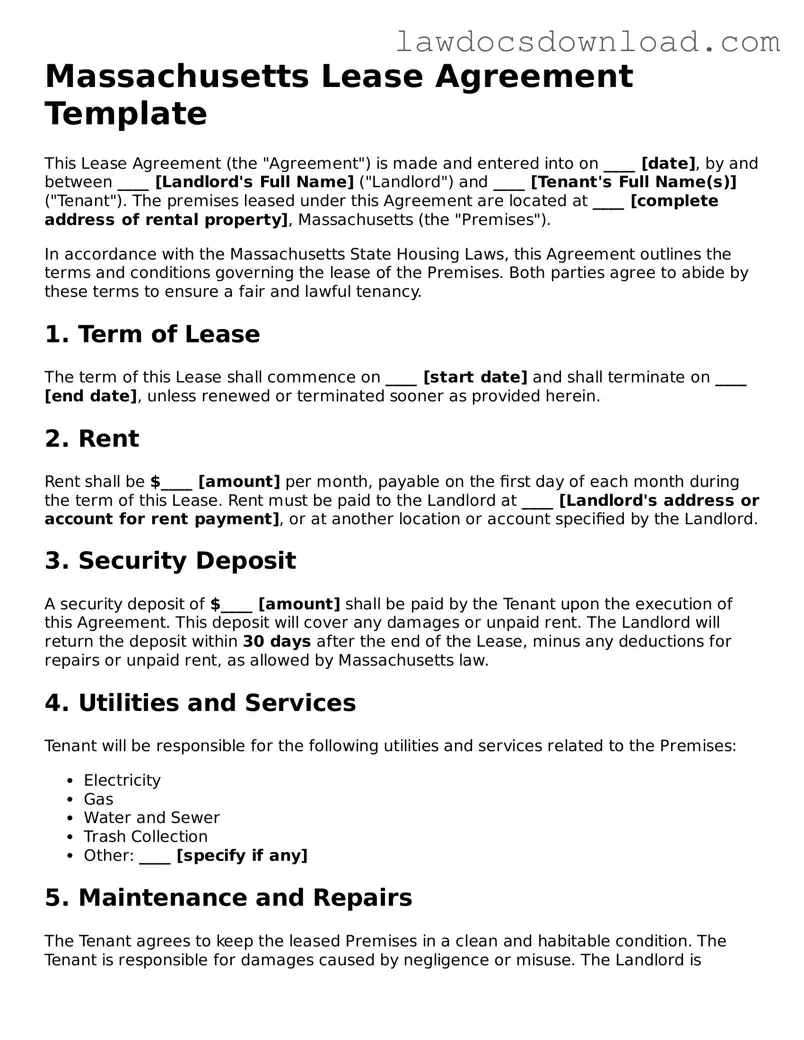Massachusetts Lease Agreement Template
This Lease Agreement (the "Agreement") is made and entered into on ____ [date], by and between ____ [Landlord's Full Name] ("Landlord") and ____ [Tenant's Full Name(s)] ("Tenant"). The premises leased under this Agreement are located at ____ [complete address of rental property], Massachusetts (the "Premises").
In accordance with the Massachusetts State Housing Laws, this Agreement outlines the terms and conditions governing the lease of the Premises. Both parties agree to abide by these terms to ensure a fair and lawful tenancy.
1. Term of Lease
The term of this Lease shall commence on ____ [start date] and shall terminate on ____ [end date], unless renewed or terminated sooner as provided herein.
2. Rent
Rent shall be $____ [amount] per month, payable on the first day of each month during the term of this Lease. Rent must be paid to the Landlord at ____ [Landlord's address or account for rent payment], or at another location or account specified by the Landlord.
3. Security Deposit
A security deposit of $____ [amount] shall be paid by the Tenant upon the execution of this Agreement. This deposit will cover any damages or unpaid rent. The Landlord will return the deposit within 30 days after the end of the Lease, minus any deductions for repairs or unpaid rent, as allowed by Massachusetts law.
4. Utilities and Services
Tenant will be responsible for the following utilities and services related to the Premises:
- Electricity
- Gas
- Water and Sewer
- Trash Collection
- Other: ____ [specify if any]
5. Maintenance and Repairs
The Tenant agrees to keep the leased Premises in a clean and habitable condition. The Tenant is responsible for damages caused by negligence or misuse. The Landlord is responsible for repairs to the structure and provided appliances, as mandated by Massachusetts law.
6. Occupancy and Use
The Premises are to be used exclusively as a residential dwelling for the Tenant(s) listed in this Agreement. The Tenant agrees not to engage in any activity that is disruptive to neighbors or violates state or local laws.
7. Governing Law
This Agreement shall be governed by and construed in accordance with the laws of the State of Massachusetts.
8. Amendment
This Agreement may only be amended or modified through a written document signed by both parties.
9. Entire Agreement
This document contains the entire agreement between the Landlord and Tenant regarding the rental of the Premises. No other promises or arrangements outside of this Agreement will be recognized.
Signatures
In witness whereof, the parties have executed this Agreement as of the date first above written:
Landlord's Signature: ___________________________________ Date: ________
Tenant's Signature: _____________________________________ Date: ________
For a complete and legally binding Massachusetts Lease Agreement, ensure that all blanks are properly filled out and the document is reviewed by legal counsel.

